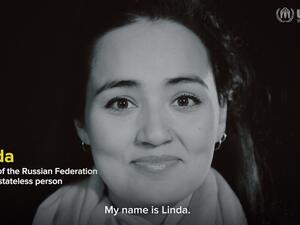Somali refugee band makes waves in Kenya
Somali refugee band makes waves in Kenya

Members of the popular Waayaha Cusub band outside the video rental business that they run in Nairobi's Eastleigh district to raise funds for their operating costs.
NAIROBI, Kenya, June 11 (UNHCR) - A group of Somali refugee musicians in the Kenyan capital Nairobi have ruffled a few feathers with their flouting of conservative traditions and their songs on sensitive issues, but they are determined to resist attempts to silence their band.
"We will keep singing and spreading our messages of hope, peace and reconciliation. We will not quit," said Shino Ali, 20-year-old leader of Waayaha Cusub (New Era), "We've suffered hardship. We've been attacked. But we will keep singing," he added.
Based in Eastleigh, Waayaha Cusub has built up a powerful following among young Somali refugees and Kenyans, who appreciate their music and their causes. Eastleigh is home to large numbers of the estimated 15,000 Somalis in Nairobi and is popularly known as Little Mogadishu.
The 11-member band was set up in 2004 by young male and female friends who had been living in the neighbourhood since fleeing their homeland in the mid-1990s and wanted to do something creative with their free time.
"We were 20 members when we started off, but some members fled to Uganda fearing retaliation from the community," said band member Abdi Weli Ibrahim, alluding to the opposition they faced from conservative members of the Somali community. He added that one member was killed in fighting between Somalia's rival parties.
Ali explained why the group was facing retaliation. "In our music videos, we have girls wearing trousers and with their hair uncovered. We got into trouble," he said, noting that conservative Somali Muslims believed that such behaviour was banned under Islamic law. "One of our band members - Jamila - had her face cut up. We believe it was because of our music. They say we are eroding the Islamic culture."
Jamila sports a large scar on her cheek and Ali alleges that she was attacked by members of her family, who disapproved of the band and her membership in it. And it's not hard to imagine a conservative Muslim getting upset with their videos, which feature modern beats, unrestrained dancing and modern dress. "Our target is the youth. Change in Somalia is dependent on the youth," Ali said, adding: "They listen to our music because they identify with it; they love it."
But perhaps most unpalatable for some among the Somali community are the subjects Waayaha Cusub sings about such as HIV/AIDS, peace and reconciliation, and atrocities in Somalia.
The song Somalia, for example, with its images of slaughter and bodies on the streets of Mogadishu, rebukes the leadership of the country for sacrificing the Somali people in their quest for power.
While some hate Waayaha Cusub, others can't get enough of them. They give many concerts, usually for free, and their songs and videos have been getting good airtime on radio and television stations. The group performs mainly in Somali, but they also sing in the Kiswahili spoken by most people in Kenya.
They have set up a small studio and run a video rental business to help pay for their operating costs. The group have made four albums, 14 music videos and one movie. "Our aim is not to make money or be famous. Our aim is to pass a message," said Ali.
"We will keep singing and performing our songs the way we are doing. We will keep encouraging the refugees and the people of Somalia, not to give up hope that peace will one day return to our country. We want to go international one day so that our message can be received by many more."
There are an estimated 170,000 Somali refugees in Kenya, mostly at the Kakuma camp in the north-west and the Dadaab camp in the north-east. Some 34,000 refugees fled across the border last year to escape fighting in their homeland. The situation remains volatile within Somalia.
By Janet Adongo in Nairobi, Kenya









